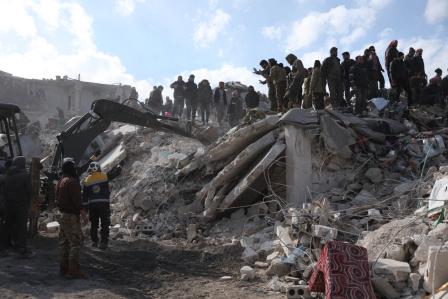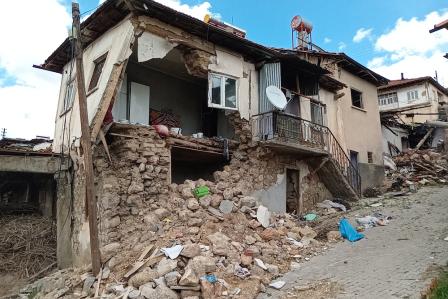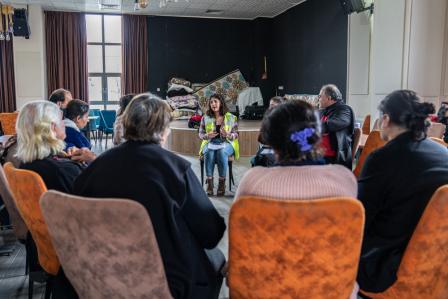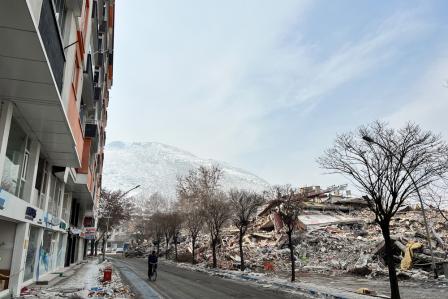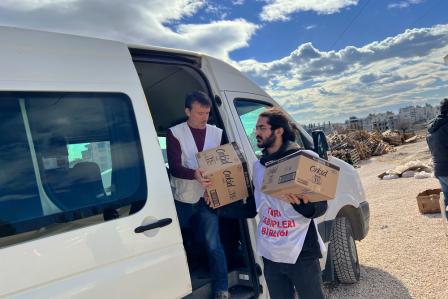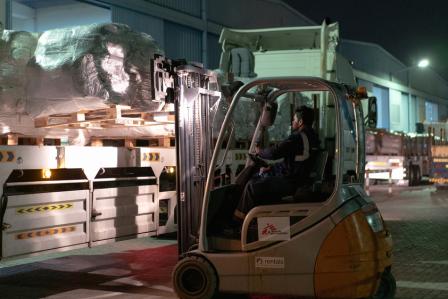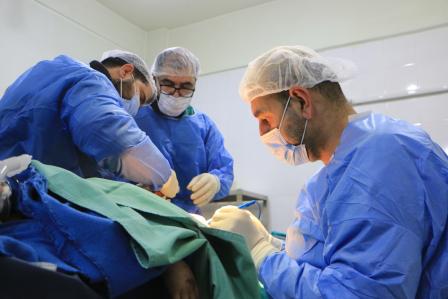"There is no time to waste in reaching the people of this region"

The impact of the earthquake. Photo was taken on 7 February 2023 in Idlib province, Northwestern Syria. Syria, 7 February 2023. © Omar Haj Kadour
According to the latest estimates, the earthquakes that hit Türkiye and Syria have killed more than 35,000 people and injured tens of thousands more. Doctors Without Borders / Médecins Sans Frontières (MSF) works with affected populations in northwestern Syria with nearly 500 staff members. At the time of the disaster, Doctors Without Borders was already there, supporting local communities in the northwest, victims of more than 12 years of war. Ahmed Rahmo, Doctors Without Borders' Project Coordinator in charge of the Idlib region and based in Gaziantep in Türkiye, shares the latest updates on the situation.
“Four days after the earthquakes, Doctors Without Borders teams have continued their emergency response in northwestern Syria. We have received very little international support from the outside so far. Our work is essential, but it is also a drop in the ocean: the needs are immense in the region. We are addressing basic needs, providing food and water and providing medical care.
Given the lack of funds for humanitarian aid and difficulties to access this landlocked area, most Syrian hospitals were already facing many difficulties and shortages. Moving supplies and medicines from Türkiye into Syria was already a challenge, as Bab al-Hawa was the only crossing point for humanitarian convoy to northwest Syria and was subject to political tensions before the disaster.
After the earthquakes, this crossing point was closed for three days and only reopened yesterday, with very little traffic so far. Humanitarian organizations working inside Northwest Syria have dipped into their emergency stocks that were on site.
 There is no time to waste in reaching the people of this region, as the delivery of supplies is crucial. Two million people are living in displacement camps, often in tents exposed to the wind. Just a week before the earthquake, a snowstorm had hit the area. Living conditions have significantly deteriorated.Ahmed Rahmo, Project Coordinator
There is no time to waste in reaching the people of this region, as the delivery of supplies is crucial. Two million people are living in displacement camps, often in tents exposed to the wind. Just a week before the earthquake, a snowstorm had hit the area. Living conditions have significantly deteriorated.Ahmed Rahmo, Project Coordinator
We have made donations of heating equipment, blankets and mattresses, all essential in these weather conditions, as temperatures are reaching negative figures at night. Today, an increasing number of people are forced to join these camps, and reception centers have been opened to accommodate more displaced people. There are 15 in the Idlib region for now, and we have launched mobile clinics to offer medical consultations in five of these. We will expand this activity in the coming days.
Doctors Without Borders teams have also intervened by donating medical items to more than 10 hospitals. We are responding to a variety of needs, which relate in particular to traumatology, obstetrical care or dialysis. We have also sent some of our medical staff from our hospital in Atmeh, which specializes in the care of burn victims, to support other hospitals, whose staff have been overwhelmed by the number of injured. Our surgeons were able to help them. We have also mobilized our ambulances to be used for transfers between hospitals.
Every day, our teams share tragic stories with us. Some of the survivors, when not hospitalized, have lost everything: their homes, their clothes, access to food, sometimes part of their family, their money, everything… and now they live in tents. They need clothes and hygiene products, they need water and food, they need everything.
- Read story from our colleague, Sherwan Qasem
Sherwan Qasem has worked with Doctors Without Borders for more than 10 yeas, in Türkiye, Syria, Somalia, and Lithuania. He is originally from Syria and now works with Doctors Without Borders’s emergency team in Amsterdam. Below, he shares his personal experience.
When I heard news of the earthquakes on Monday morning, I immediately tried to contact my family and friends in Syria. I couldn't reach them, as there was no electricity or internet. Sitting there, imagining what might have happened, was very stressful.
I finally managed to get through to my mom on the phone. She said everybody felt it was the last minute of their lives. Luckily, all my family members were ok. But many people are struggling. A lot of houses and buildings were destroyed, resulting in a shocking number of deaths and injuries and causing damage to infrastructure in Türkiye and in Syria. Thousands of people are now homeless.
In northwestern Syria, Doctors Without Borders-supported hospitals have seen thousands of injured people and hundreds who died. We are expecting the numbers to increase, as there will likely be fewer survivors found at this point.
I'm in touch with my colleagues in the western Aleppo countryside, where I used to work with Doctors Without Borders. They say the situation is extremely dire. This area has been at war for more than 11 years, so the medical sector was already struggling before the earthquake.
Doctors Without Borders has two main priorities right now. First, to support the hospitals and existing health facilities to respond to this emergency with supplies and training. We also provide them with fuel so they can have electricity and heating. Syria—like many countries around the world—is struggling with the energy crisis stemming from the war in Ukraine. They don't have enough fuel to run generators.
The second is to bring in supplies. One of the main problems is the lack of access to this area. The only access is through one humanitarian corridor. For years it has been difficult to deliver support and supplies to this region and unfortunately it has not been any easier in the last few days. No aid could reach the area in the first 48 hours after the earthquake—the vital timeframe for survivors. We call ourselves Doctors Without Borders, but unfortunately there are many borders, and we are trying to overcome them and find different ways to deliver this aid to these people in need.
There are around 4 million people living in this region, 2.8 million of whom have already been displaced—some more than once. I’ve met people who have been displaced 20 times. Many of these people have been unable to leave the country because they lack resources, or they choose to remain to take care of their relatives who are sick, who need support, or who are unwilling to leave the country of their birth. On top of this, there are more than 3.6 million Syrian refugees in Türkiye, the majority of whom were living in the four provinces most affected by the earthquake. When people fled Syria into Türkiye to seek safety, most wanted to stay as close as possible to the Syrian border so that they could one day return home.
One of the biggest needs now is mental health. Imagine if you are living in a camp, in a tent, in a makeshift house, after maybe many years of conflict without any kind of hope for what may happen tomorrow? The mental health burden is severe.
Yesterday my mother said to me: “My son, I don't know what may happen tomorrow. Every year for 12 years we have hoped that this would be the last year of our suffering.”

Our team in Syria delivered 270 kits with non-food items including hygiene items, kitchen kits, winter kits and blankets, in Jandaris area, in the Afrin district, and in camps and shelter centers receiving people affected by the earthquakes in northern Aleppo. Syria, February 2023. © MSF
Humanitarian organizations must also protect these populations against cholera, which has recently spread in the region since last September and which proliferates in such precarious conditions and lack of access to clean water. The Doctors Without Borders teams has tackled this disease in the past months, but our organization can’t cover all the need, especially as the general situation is worsening. For many inhabitants of this region, living conditions have become even more dire.”
